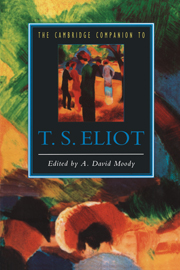Book contents
- Frontmatter
- 1 Where is the real T. S. Eliot? or, The Life of the Poet
- 2 Eliot as a product of America
- 3 Eliot as philosopher
- 4 T. S. Eliot's critical program
- 5 The social critic and his discontents
- 6 Religion, literature, and society in the work of T. S. Eliot
- 7 “England and nowhere”
- 8 Early poems
- 9 Improper desire
- 10 Ash-Wednesday
- 11 Four Quartets
- 12 Pereira and after
- 13 “Mature poets steal”
- 14 Eliot's impact on twentieth-century Anglo-American poetry
- 15 Tradition and T. S. Eliot
- 16 Eliot
- 17 Eliot studies
- A Select Booklist
- Index
16 - Eliot
Modernism, Postmodernism, and after
Published online by Cambridge University Press: 28 May 2006
- Frontmatter
- 1 Where is the real T. S. Eliot? or, The Life of the Poet
- 2 Eliot as a product of America
- 3 Eliot as philosopher
- 4 T. S. Eliot's critical program
- 5 The social critic and his discontents
- 6 Religion, literature, and society in the work of T. S. Eliot
- 7 “England and nowhere”
- 8 Early poems
- 9 Improper desire
- 10 Ash-Wednesday
- 11 Four Quartets
- 12 Pereira and after
- 13 “Mature poets steal”
- 14 Eliot's impact on twentieth-century Anglo-American poetry
- 15 Tradition and T. S. Eliot
- 16 Eliot
- 17 Eliot studies
- A Select Booklist
- Index
Summary
Few readers would disagree that Eliot the man has been as much a puzzle as Eliot the poet. Two small books, with others, have now begun to clarify that puzzle. The chief contribution of biography is to present relevant personal facts, and Ms. Gordon's patiently assembled facts have pointed, very pertinently, to how readers might have erred in their puzzlement over Eliot by not recognizing what might now be considered obvious: that Eliot's work represents a series of efforts, each trying to make sense of a persistent moral dilemma. The oeuvre of T. S. Eliot will appear to us differently if, instead of treating the whole Collected Poems as due to Eliot's “impersonal” aesthetic, we perceive his poetry as negotiating intractable personal material which persists even in the final form.
We now know, in some detail, that there was indeed another woman in the life of the man, and that much of the work of the poet can be seen as full of some emotional and moral matter which the writer would not expose to light, and could not go away from. Since the only way of negotiating a moral dilemma is to find an objective situation which corresponds to that specific dilemma, it may be that Eliot's problems were such that the very données precluded objective resolution. And the alternative to resolution, in anyone who knows what it means to endure a situation one wants to escape from, may indeed be a form of madness, perhaps less the intensity of insanity than the desperate role-playing of the apparentposeur. We need, to be sure, a great many more facts in Eliot's biography; we should like to know, for example, whether, when and in relation to what personal crisis, he read Milton's The Doctrine and Discipline of Divorce. Certainly his animus towards Milton can seem in excess of the verse as we know it.
- Type
- Chapter
- Information
- The Cambridge Companion to T. S. Eliot , pp. 223 - 235Publisher: Cambridge University PressPrint publication year: 1994
- 1
- Cited by



